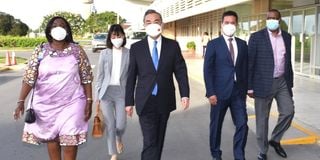Premium
Chinese Foreign Minister criticises US sanctions on Eritrea

Chinese Foreign Minister Wang Yi (centre) with Kenya’s Foreign Affairs Cabinet Secretary Raychelle Omamo (left) upon arrival at Moi International Airport, Mombasa on January 5, 2022.
What you need to know:
- Mr Wang was visiting Eritrea for the first time as Foreign Minister, reflecting the changing tide in ties with the Horn of Africa country.
- While keeping off internal regional politics, the joint statement indicated Beijing’s displeasure with the US sanctions on Eritrea.
Visiting Chinese Foreign Minister Wang Yi on Wednesday criticised US sanctions on Eritrea for its role in the Tigray conflict, in neighbouring Ethiopia.
In a joint statement issued after Mr Wang met with Eritrean counterpart Osman Saleh, the two sides said the sanctions imposed in November amounted to external interference, even as Eritrea pledged to support the One-China policy on what constitutes the actual foreign representation of China abroad.
“Both sides agreed to uphold the common values of peace, development, fairness, justice, democracy and freedom for all mankind, and oppose hegemonic interferences in the internal affairs of other countries under the pretext of democracy and human rights,” the dispatch indicated.
“The Chinese side stands against any unilateral sanctions on Eritrea. The Eritrean side reaffirms adherence to the One-China principle.”
The One-China Policy, upheld by most African countries, except the Kingdom of eSwatini., says Beijing is the capital of China and only Beijing can send diplomats abroad to represent what is known as the People’s Republic of China.
It is the product of lobbying by Beijing for the world to ignore the pleas of Taiwan (officially known as Republic of China) from seeking international recognition.
Mr Wang was visiting Eritrea for the first time as Foreign Minister, reflecting the changing tide in ties with the Horn of Africa country that only recently signed on China’s Belt and Road Initiative (BRI); the ambitious programme meant to connect China with Asia, Africa and Europe via sea, land and air transport connections.
But while keeping off internal regional politics, the joint statement indicated Beijing’s displeasure with the US sanctions on Eritrea.
In November, the State Department said it was designating six targets associated with the Eritrean government and ruling party, including the Eritrean army, for “destabilising presence in Ethiopia is prolonging the conflict, posing a significant obstacle to a cessation of hostilities, and threatening the integrity of the Ethiopian state.”
It said the decision were based on “credible accounts” that implicated Eritrean forces in serious human rights abuses, when it took part in the Tigray conflict earlier last year, on the invitation of Ethiopia.
US Secretary of State Antony Blinken said the designations showed his country would use “appropriate tools at our disposal to impose tangible costs on those prolonging the conflict and to promote an immediate end to the violence.”
The sanctions were criticised by Ethiopia which argued they had been misplaced as the actual purveyor of atrocities, Addis Ababa said, was the Tigray People’s Liberation Front (TPLF), the rebel group that has been fighting government forces since November 2020.
Mr Wang’s critical stance on the sanctions may now reflect China’s direct interest in the Tigray conflict. In November, he visited Addis Ababa and said Ethiopia was capable of dealing with the conflict without external interference. He was due to arrive in Nairobi on his second leg of the Africa tour that will also take him to Comoros this week.
In Asmara, he agreed with Eritrean leaders for the “consolidation and development of the Strategic Partnership …rooted on the tradition of mutual support, based on similarities in the historical trajectories of the two countries and their shared values, predicated on respect of the rule of law, independence, sovereignty, territorial integrity and cooperation, aimed at promoting global and regional peace, stability and prosperity.”





